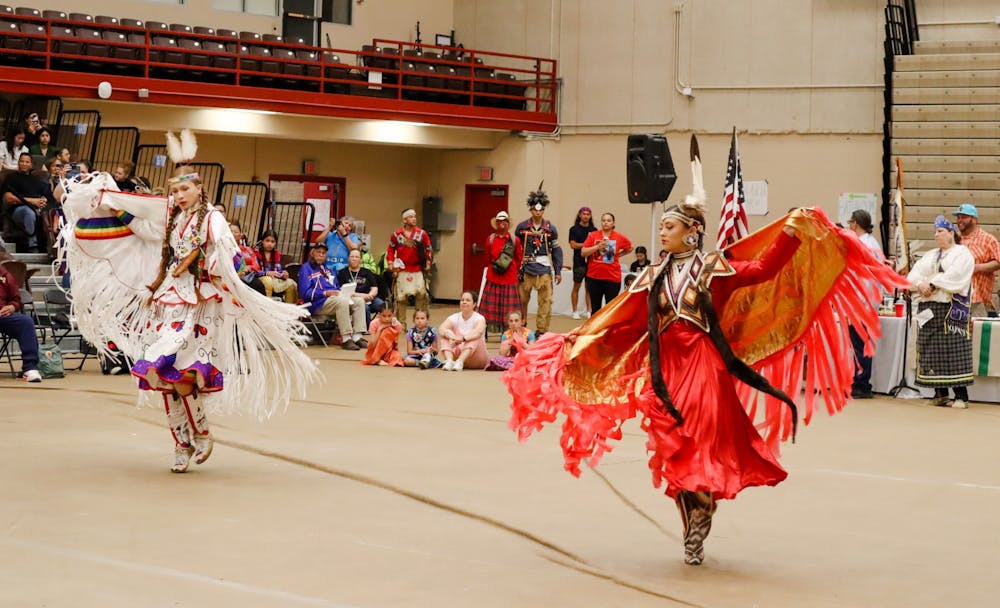The Native American Heritage Series at the Brown Center for Students of Color and Natives at Brown hosted the 20th annual Spring Thaw Powwow at the Pizzitola Sports Center this Saturday.
The Powwow featured food, dancing and booths where Indigenous artisans sold their jewelry, clothing and other handmade goods to provide Indigenous community members the opportunity to reunite and celebrate the arrival of the spring season.
This year’s Spring Thaw Powwow was organized by Ashlyn Lovato ’23 and Kalikoonāmaukūpuna Kalāhiki ’24.
‘Transforming spaces into sacred spaces’: Organizing the Powwow
Kalāhiki and Lovato began planning the Powwow last October, according to Kalāhiki, with support from Anne-Marie Ponte, BCSC coordinator for co-curricular initiatives.
“Ashlyn has really spearheaded all of this,” Kalāhiki said. “This wouldn’t be possible without her.”
Kalāhiki described the event planning as a “very involved” and “educational” process. “It’s cool because my first Powwow is one that I’ve helped to organize.”
Kalāhiki said that planning the event made them “feel grounded.”
“I miss home as a Native person,” they said. Being “around other Indigenous people who are very rooted in their culture, very rooted in their language and very deeply connected to their lands makes me feel connected back to my home even though I’m so far away.”
Kalāhiki hopes that the event can create a sacred space within an Ivy League institution “that has caused and perpetuated … settler colonialism.”
“This is Narragansett land. And part of being a Brown student … is understanding that we are settlers contributing to the displacement of Native American peoples,” they said. “Events like these redefine what these spaces are … and indigenize” them.
Showing ‘people we’re still here’: Vendors at the Powwow
The Powwow included a variety of vendors, many of whom had attended the event in previous years. Joshua Robinson, who is affiliated with the Narragansett Indian Tribe, said he comes “almost every year” to the Spring Thaw Powwow to sell handmade goods from his mother.
Keiko Moreino, who is of Nottoway Rappahannock and Cape Verdean descent, has “been coming to this Powwow for a long time.” Moreino creates “regalia-style clothes,” including “ribbon shirts, ribbon skirts (and) ribbon dresses.”
Some vendors said that the Powwow serves as a reunion for local Indigenous People as the warm weather dawns. “It’s a time where we gather and we see people we haven’t seen in the winter time,” Moreino said. “It’s always a refreshing way to start the year.”
Cheyenne Pocknett-Galvin, a vendor at the event who is Mashpee Wampanoag, said the Spring Thaw Powwow is “exciting for everybody who's been home all winter” because it’s “the first Powwow to kick off the year.” At the Powwow, Pocknett-Galvin sold strawberry lemonade and Indian tacos for Sly Fox Den, a restaurant in Charlestown that she owns with her sister and mother.
Belinda Miliano, a vendor who identifies as part of the Passamaquoddy Tribe and Sipanyik, described the Powwow’s attendees as “an extended family.”
She described being especially grateful for these spaces since the onset of the COVID-19 pandemic because they enable people to “spend time together and learn from each other.”
Miliano is a contemporary artist and beader who “started making dream-catchers when (she) was a little girl,” she said. “It wasn’t until I graduated from college that I really started experimenting more with beadwork,” which incorporates glass beads and porcupine quills that Miliano cleans and trims herself.
Miciah Stasis, from the Herring Pond Wampanoag community, described her work as “a mixture of different things.”
In addition to doing quill work, dying and embroidering, Stasis works with the wampum shell, which is “special” to the east coast, she said. “Our people have been doing wampum work for thousands of years, it’s how we tell our stories, how we heal.”
Stasis said that the Powwow is “good medicine” because it allows Indigenous groups to “celebrate each other and (show) people we’re still here.”
‘Empowering for me to be here’: Non-profit organizations at the Powwow
The Spring Thaw Powwow also featured tables for nonprofit organizations.
Nanette Thayer attended the Powwow on behalf of the Rhode Island Indian Council's Indian Parent and Child Services, which is an “off-reservation program serving Rhode Island Native families to strengthen Native culture and reduce the incidence of child abuse,” according to a card for the organization at the event.
“The mainstay of the (Rhode Island Indian Council) has been the workforce program from 1975 forward, but in the last two years, we’ve added a child and parent services program that’s aimed at keeping Native families intact and well-supported,” Thayer said. “We’re trying to make sure that families are reaching their full potential.”
Reyna Symonds, who is Seaconke Wampanoag, was representing the Indigenous Empowerment Corporation, which includes mentorship programs that encourage financial literacy. The organization aims “to help (participants) understand their culture and also get them to have basically generational wealth,” Symonds said.
Symonds described events like the Powwow as “part of my culture.”
“It’s empowering for me to be here,” she said.
Correction: A previous version of this story misstated that Rayna Symonds and the Indigenous Empowerment Corporation were affiliated with the R.I. Indian Council. A previous version of this story also misidentified Keiko Moreino as being of Pequot descent.The Herald regrets these errors.
Indigo Mudbhary is a University news senior staff writer covering student government. In her free time, she enjoys running around Providence and finding new routes.





